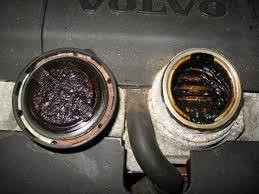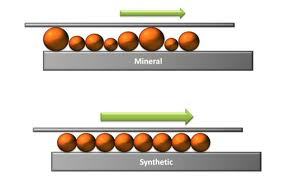The Difference in Diesel Engine Oils
“Diesel engine oils are considered as the lifeblood of your truck or RV. It performs many functions that are integral to several important processes in your workhorse. One, it prevents the metal surfaces in the engine from rubbing with each other and creating friction. Two, it is also responsible for transferring heat produced from the combustion cycle. Three, it minimizes oxidation at higher temperatures. Engine oils perform all these functions while under tremendous heat and pressure.“
The Difference in Diesel Engine Oils
There are various types of engine oils available in the market today. We describe two of the most common below:
 Mineral or Petroleum Engine Oils
Mineral or Petroleum Engine Oils
A by-product of petroleum, this oil type is produced by fractional distillation or the splitting of petroleum into different parts. It is a direct by-product of crude and is comprised of cyclic paraffins and alkaline. This oil type has been the most in demand lubrication product for all engine types for many generations.
Petroleum oils provide protection for the engine. However, this oil type has shortcomings that negate it from being the best protection available. In fact, petroleum oils have properties that are both beneficial and not beneficial to an engine.
For example, petroleum oils break down and oxidize the moment oil temperature exceeds 240F. Oxidation, in turn, increases the possibility of wear and the formation of deposits. On the other hand, this type of oil can also turn thick and have trouble flowing at very low temperatures (-40F). When this happens, sludge can develop and block oil passages.
Petroleum diesel engine oils have to be supplemented with additives to provide good and long-term protection. Doing so extends the service life and also considerably reduces the wear of engine parts.
 Synthetic Diesel Engine Oils
Synthetic Diesel Engine Oils
Before being used in automobiles, this type of engine oil was first used in fighter jets. Synthetic oils were introduced to the market in 1972 and have gradually increased in popularity due to the better protection they provide to engines.
Synthetic diesel oils are different from petroleum oils in a number of ways. First, they are artificially prepared rather than being pumped from the earth. They undergo a perfected process and utilize developed stocks as well. Majority of engine oils of this type are based on polyesters, polyglycols, polyolefin, alkylated benzene, and alkylated naphthalene. While petroleum engine oils have differently sized molecules, synthetic engine oils have a uniform molecular structure.
The disadvantage of this engine oil is its price. Since its manufacturing process is more complex than petroleum diesel engine oils, they cost almost four times the price of the latter. This factor can be a little problematic for vehicle and fleet owners during oil changes. On the other hand, they are also more durable and longer lasting than petroleum oils.
The Main Difference between Petroleum and Synthetic
The biggest difference between these two types is their molecular structure. Synthetic oil has a consistent molecular structure so it has more consistent properties than petroleum. Petroleum diesel engine oils, on the other hand, come from nature and are not uniform in their structure.
 Which is the Best Diesel Engine Oil for Your Engine?
Which is the Best Diesel Engine Oil for Your Engine?
Synthetic diesel engine oils with its more stable suite of properties are an obvious answer. With their uniform particulate structure, they are more capable of accommodating a wider range of uses.
Diesel engine oils of this type, moreover, are more commonly recommended for extreme conditions. Petroleum diesel engine oils break down when put under too much heat and turn more solid when left too cold. The uniform molecular structure of synthetic oil, on the other hand, provides maximum protection against wear under hot and cold conditions. This means that there is lesser chance of sludge formation in the engines components.
Is it proven?
Synthetic diesel engine oils have also been shown proven to provide better protection for engines, gearboxes, moving components, hydraulic systems, and gearboxes. Using synthetic diesel engine oil aids components to perform at their best which, in turn, results to improved fuel economy and more power as compared to petroleum engine oils.
This oil type also has longer oil change intervals as well. Petroleum diesel engine oils are recommended to be changed every 3,000 to 5,000 miles. Synthetics, on the other hand, take 6,000 to 10,000 miles before they are required to be changed. Since they last longer, this cancels out the disadvantage of synthetic diesel engine oils being more expensive than the other. Want to go more in-depth? Read this article about oil changes and how often you need them
Another good point of synthetic diesel engine oils is their being eco-friendly. Given that they last up to three times longer than petroleum, change intervals are also less frequent. The lesser the oil changes, the lesser the waste-disposal problem there is.
Lastly, synthetic diesel engine oils offers better heat and start-up protection than petroleum. Synthetics are free of contaminates common in petroleum so it offers smoother movement between moving parts. This factor considerably lessens the chance of heat and friction developing between these parts. As for start-up, synthetic diesel engine oils have more fluid properties that make it easy to reach moving parts during engine start-up as well. This is different from petroleum which can thicken during cold weather and stress the engine due to its inability to immediately provide oil to all moving parts.
If you’re looking for an exceptionally high quality diesel engine oil, take a closer look at CleanBoost® Diesel Duty15W40 Motor Oil here.
About the Author
Tech Guy
Automotive enthusiast, passionate about Jeeps, hot-rods, turbos, performance, efficiency, diesels, fuels, high performance oils, additives and anything with an engine.

